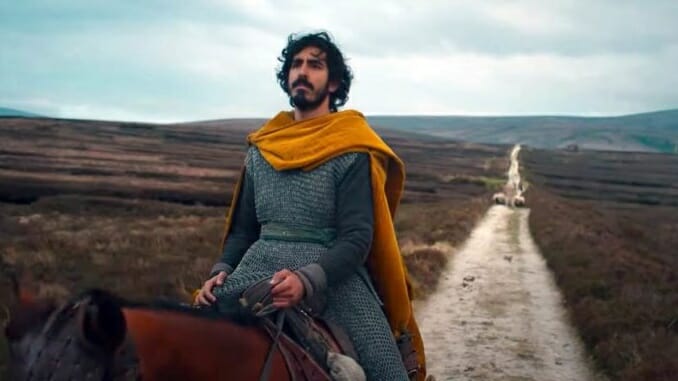The Green Knight’s Source Material Is the Perfect Story for Our Current Moment

Arthurian storytelling is just not a surefire winner at the box office in the United States. It may be a fundamental incompatibility with our national character or something, or it just may be that the last few specimens have not been very good. King Arthur (2004), starring Clive Owen, was boring and unimaginative, and 2017’s King Arthur: Legend of the Sword with Charlie Hunnam was ridiculous. It seems a sad truth that, when Hollywood gets its hands on them, the grandest stories so often become the laziest adaptations.
This is why the fearful, foreboding take by David Lowery, out today from studio A24, is so intriguing. The Green Knight is based on the old tale “Sir Gawain and the Green Knight,” a story traced to the 14th century, one of the most popular translations of which comes to us from none other than J.R.R. Tolkien. It’s up there with Mallory in being part of the “canon” of Arthurian literature. And like Mallory, it is rooted partly in tragedy and fallibility, of the kind that could make it the perfect subject for a creepy film adaptation. (Speaking from experience, it makes a great campfire story for four kids.)

Arthur and his court are celebrating Christmas in high medieval style when the doors of Camelot fly open and in strides a knight all in green. Not just his clothes and armor, but everything: His face, hair, the steed he rides on, all his weapons and accoutrement. He challenges any man there to a contest of strength. None are brave enough to accept until Gawain steps forward. The challenge is the same one Tyler Durden poses in Fight Club: Hit me as hard as you can. The caveat is that the Green Knight gets to return the blow in kind. The chosen weapon is the knight’s massive axe.
Gawain, thinking the knight can’t possibly survive a blow to the neck from an axe, steps up and beheads the guy. The Green Knight, barely inconvenienced by the loss of his head, invites Gawain to come to the Green Chapel in a year’s time to receive the answering blow. He doesn’t bother providing any directions to the place, so Gawain armors up and takes up the search. We’re assured he fights tons of monsters and crosses into dangerous places in his search, but eventually comes to a hospitable castle where a gracious lord and his wife put him up for a few nights just a couple miles from his ultimate goal, mere days before his fateful appointment.
Of course the castle is not wholly what it appears (or at least the lord is not), and it becomes clear to the reader that the mundane pleasantries of the lord’s court and his insistence on Gawain’s continued presence there are part of an entrapment. Gawain survives his ordeal, but he returns to Arthur’s court changed by the knowledge of his own failings. His virtues are still worthy, but he is not always worthy of them, and he’ll need to live with that.
As translated by Tolkien, the poem is a great deal longer than is needed to tell the substance of the story: Any speaker around a campfire could get through it in five minutes, even if they were doing voices for all the characters and slathering on their own embellishment. Any adaptation of feature film length is going to need to make some dedicated choices. The choice other Arthurian adaptations seem to have made over the years is to be gritty, or to be epic (to the point where we need to be sure that the word “sword” is in the title, in case you thought a story about King Arthur could not involve a sword somewhere).
-

-

-

-

-

-

-

-

-

-

-

-

-

-

-

-

-

-

-

-

-

-

-

-

-

-

-

-

-

-

-

-

-

-

-

-

-

-

-

-










































